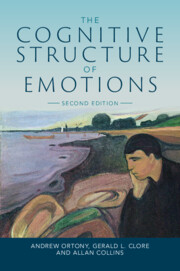Book contents
- The Cognitive Structure of Emotions
- The Cognitive Structure of Emotions
- Copyright page
- Dedication
- Contents
- Figures
- Tables
- Preface to the Second Edition
- Preface to the First Edition
- Chapter 1 Introduction
- Chapter 2 Overview of the Theory
- Chapter 3 Appraisal, the Value System, and Primary Sources of Intensity
- Chapter 4 Factors Affecting the Intensity of Emotions
- Chapter 5 Reactions to Events: I
- Chapter 6 Reactions to Events: II
- Chapter 7 Reactions to the Actions of Agents
- Chapter 8 Reactions to Objects
- Chapter 9 Formalization of the Theory and Additional Issues
- Chapter 10 There and Back Again: OCC and Affective Computing
- Appendix
- References
- Author Index
- Subject Index
Chapter 10 - There and Back Again: OCC and Affective Computing
Published online by Cambridge University Press: 04 August 2022
- The Cognitive Structure of Emotions
- The Cognitive Structure of Emotions
- Copyright page
- Dedication
- Contents
- Figures
- Tables
- Preface to the Second Edition
- Preface to the First Edition
- Chapter 1 Introduction
- Chapter 2 Overview of the Theory
- Chapter 3 Appraisal, the Value System, and Primary Sources of Intensity
- Chapter 4 Factors Affecting the Intensity of Emotions
- Chapter 5 Reactions to Events: I
- Chapter 6 Reactions to Events: II
- Chapter 7 Reactions to the Actions of Agents
- Chapter 8 Reactions to Objects
- Chapter 9 Formalization of the Theory and Additional Issues
- Chapter 10 There and Back Again: OCC and Affective Computing
- Appendix
- References
- Author Index
- Subject Index
Summary
Computer scientists Jonathan Gratch and Stacy Marsella trace the influence of the 1988 publication of the OCC model, noting its impact on computational models of the interplay between emotion and cognition and on practical applications such as those relating to emotion recognition and the generation of emotion-related behaviors. They explain how OCC’s detailing of specific rules for reasoning about emotions invigorated work in affective computing and artificial intelligence more generally by giving computer scientists a clear pathway for modeling emotion processes. The model, they suggest, had both “upstream influences” on work concerning the cognitive antecedents of emotions, and “downstream influences” on work focused on modeling some of the consequences of emotions, such as those concerned with coping and decision-making and their relation to changes in beliefs, desires, and intentions. Finally, at a more sociology of science level, the authors suggest that the OCC model contributed significantly to bringing together the emotion research community in psychology and computer science communities interested in modeling affective phenomena.
Keywords
- Type
- Chapter
- Information
- The Cognitive Structure of Emotions , pp. 232 - 247Publisher: Cambridge University PressPrint publication year: 2022



